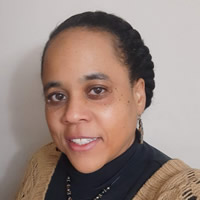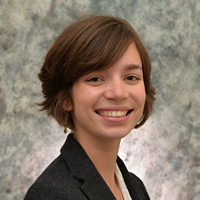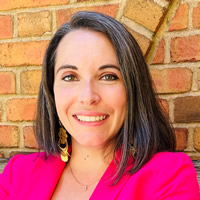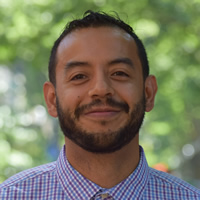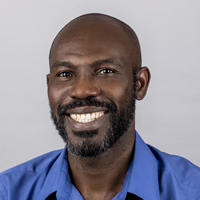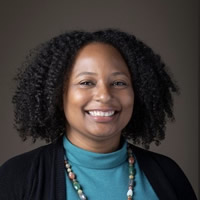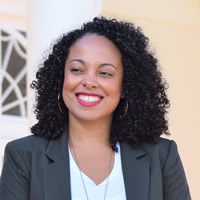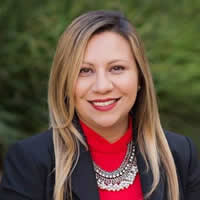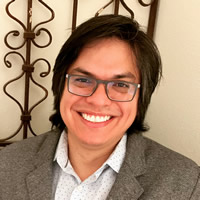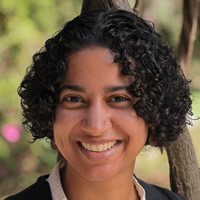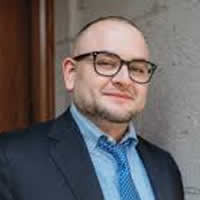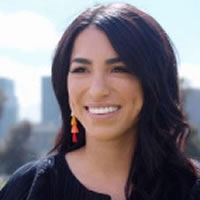IRP’s Emerging Poverty Scholars Fellowships provide exceptional junior scholars from underrepresented racial and ethnic populations with flexible funding over a two-year award period.
The Fellowship supports the career development and success of these scholars by
- enhancing the resources available to them;
- providing high-quality one-on-one mentoring from nationally renowned senior poverty scholars; and
- fostering interaction among a diverse set of scholars through quarterly meetings with the Emerging Scholars cohort and experts in the field; and
- providing opportunities to highlight the research of the Emerging Scholars through IRP products and events in order to broaden the corps of U.S. poverty researchers.
Beyond providing Fellows with flexible funding and opportunities for expanding their networks and receiving feedback on their research and career trajectories, the program intends to establish long-term relationships between Fellows and other poverty scholars, which may lead to future collaborations.
Fellowships may be used for a wide range of professional development activities, including
- engaging in substantive and methodological training;
- travel for data collection, collaboration, or research presentation;
- funding research assistants;
- securing release time from teaching; or
- summer salary support.
View Webinar: About the Fellowship and How to Apply | Presentation Slides
2023–2025 Emerging Poverty Scholar Fellows
Monica Adams
Position title: 2023–2025 Emerging Poverty Scholar
Monica Adams is an Assistant Professor of Social Work at Binghamton University. Her broad research interest is health disparities with a more specific focus on the links between socioenvironmental risk factors like food insecurity and poor health outcomes among people with low-income backgrounds. She is interested in studying how limited access to resources influences decision making around health behaviors.
Monica Adams on Facebook | Binghamton University Department of Social Work on Facebook
Mariana Amorim
Position title: 2023–2025 Emerging Poverty Scholar & 2023–2024 Visiting Poverty Scholar
Mariana Amorim is an Assistant Professor of Sociology at Washington State University. Her work sheds light on the role of public, private, and “shadow” safety nets in promoting the well-being of parents and children during an era of increasing family complexity and economic inequality.
Andrea Gómez Cervantes
Position title: 2023–2025 Emerging Poverty Scholar
Andrea Gómez Cervantes is an Assistant Professor in the Department of Sociology at Wake Forest University. Her research specializes in international migration and immigration policies, social inequality and socioeconomic mobility, families, and gender violence. As a Mexican immigrant, she is especially interested in creating initiatives that address the well-being of immigrant families and communities in the U.S.
X/Twitter: @AndreaGC_soc | @wfsocdept @WakeForest
José Loya
Position title: 2023–2025 Emerging Poverty Scholar
José Loya is an Assistant Professor in Urban Planning at UCLA’s Luskin School of Public Affairs and faculty affiliate with the Chicano Studies Research Center. His research addresses Latino issues in urban areas by connecting ethno-racial inequality and contextual forces at the neighborhood, metropolitan, and national levels. His research discusses several topics related to stratification in homeownership, including ethno-racial, gender, and Latino disparities in mortgage access.
Courtnee Melton-Fant
Position title: 2023–2025 Emerging Poverty Scholar
Courtnee Melton-Fant is an Assistant Professor of Health Systems Management and Policy at the University of Memphis. Her research examines how state and local government politics and policies shape population health and racial health inequalities.
X/Twitter: @CourtneeMelton; @uofmemphis; @UofMemphisSPH
2022–2024 Emerging Poverty Scholar Fellows
Daniel Auguste
Daniel Auguste is an Assistant Professor of Sociology at Florida Atlantic University. His research interests include inequality, stratification, economic and organizational sociology, and entrepreneurship. More specifically, his research agenda seeks to understand the structural forces determining who gets what, who participates and to what level they participate in the capitalist production process. In this fellowship, Auguste will investigate the extent to which racial wealth inequality influences racial disparities in business ownership and success; investigate the economic conditions under which entrepreneurship may facilitate social mobility in the United States; and examine the link between employment quality and business ownership and success.
Twitter: @Daniel2Auguste | @FAUArtsLetters
Karina Chavarria
Karina Chavarria is an Assistant Professor of Sociology at California State University Channel Islands. Broadly, her research agenda bridges multiple sociological sub-fields: education, migration, and race and ethnicity. In particular, she examines the relationship between educational inequalities, as these impact marginalized youth across race/ethnicity and immigration status, and youth’s agency in enacting transformative social change. Chavarria will use this fellowship to further her current research which aims to advance our understanding of the academic and economic outcomes of Latinx youth in Ventura County via an assessment of the challenges and opportunities shaping their educational and employment prospects amidst the devastations produced by COVID.
Twitter: @csuci | @UCLA_CSRC
Linsey Edwards
Linsey Edwards is an Assistant Professor of Sociology at New York University. She studies neighborhood, organization, and work-based practices that contribute to the persistence of poverty and near-poverty in the United States. Edwards also works to evaluate social welfare program interventions that have the potential to reduce administrative burden for low-income citizens. She will use this fellowship to finish her book entitled, “The Time Trap” which will inform policy and practice by reshaping the assumptions some policymakers and program administrators have about how low-income households use their time and influence these actors to think more explicitly about how programs can reduce structural barriers for these groups.
Twitter: @NYUSociology | @ArtsandScience
Casey Nichols
Casey Nichols is an Assistant Professor of History at Texas State University. She specializes in the areas of African American history, Mexican American history, U.S. urban history, and movements for social justice. Her current book project (under contract with the University of North Carolina Press), “Poverty Rebels: Black and Brown Protest in Post-Civil Rights America,” examines post-1965 antipoverty policy with a specific focus on how these polices shaped the relationship between African Americans and Mexican Americans in Los Angeles and brought new significance to Black-Brown relations as U.S. racial paradigm. In this fellowship, Nichols will continue work on her book manuscript and her next project titled, “The Intellectual History of Resistance, Class, and the U.S. City.”
Twitter: @DrCDNichols | @txstla | @TXSTHistory
Alberto Ortega
Alberto Ortega is an Assistant Professor in the O’Neill School of Public and Environmental Affairs at Indiana University. He is an economist and public policy scholar with health and social policy research, focusing on the well-being of underserved and vulnerable populations. Ortega’s earlier work examined educational barriers and inequities faced by racial and ethnic minorities. His current research explores issues surrounding access to health care and social determinants of health outcomes, including substance use, mental health, and mortality resulting from victimization. As an Emerging Poverty Scholar, he plans to extend his recent research agenda by examining the effects of school and residential segregation on inequities in well-being, health behaviors, and health outcomes.
Twitter: @berto_econ | @IUONeill | @IUBloomington | @ASHE_ASSA
2021-2023 Emerging Poverty Scholar Fellows
Brittany Battle
Brittany Pearl Battle is Assistant Professor of Sociology at Wake Forest University. Her research interests include social and family policy, courts, and carceral logics. Her book project (under contract with NYU Press), They’re Stealing My Opportunity to Be a Father, examines how the child support system (re)produces carcerality as a state intervention in the family. Battle is also the co-founder of Triad Abolition Project, a grassroots organization based in Winston-Salem, NC, working to dismantle the carceral state. Her project for the Emerging Poverty Scholars Fellowship will examine the experiences of low-income people and communities in diverse judicial settings and forms of community confinement.
@Dr_B_Pearl | @wfsocdept | @WakeForest | @WakeForestNews
Jamein Cunningham
Jamein P. Cunningham is an Assistant Professor at the University of Texas at Austin School of Law and the LBJ School of Public Affairs (formerly an Assistant Professor in the Jeb E. Brooks School of Public Policy at Cornell University with a joint appointment in the Department of Policy Analysis & Management and the Department of Economics). He is also a faculty affiliate at the Cornell Population Center and the Cornell Center for Social Sciences. His interests lie at the intersection of economic history and urban economics, with particular emphasis on the lasting impact of public policies from the 1960s and 1970s. Cunningham’s research agenda currently consists of four broad overarching themes focusing on institutional discrimination, access to social justice, crime and criminal justice, and racial inequality. He plans to focus his time as a Fellow completing two new projects: “Access to Public Assistance and Infant Mortality: Evidence from the Legal Services Program in the 1960s”; and “The War on Drugs, Byrne Grants, and Incarceration,” with co-author Robynn Cox.
@DrJPCunningham
Ivis Garcia
Ivis Garcia is an Associate Professor in the Department of Landscape Architecture & Urban Planning at Texas A&M University. Her most recent community engagement research has sought to elucidate currently existing as well as historic relationships between market typologies, the structured dynamics of housing stratification and distribution, advocacy, and community organizing strategies in diverse (primarily Latino) communities. Her work has implications pertaining to inequality in recovery from disasters and the role of the state in housing policy more generally. In addition, Garcia chairs Planners for Puerto Rico—a group of academic and practitioner planners—in which she collaborates on recovery efforts in Puerto Rico after Hurricane Maria and is a board member of the National Puerto Rican Agenda. Garcia plans to use this fellowship to follow the relocation experiences of 100 households in two rural Puerto Rican communities affected by Hurricane Maria in 2017. Her work will enhance the scientific understanding of post-disaster community relocation decisions amidst uncertainty within communities of color.
@Ivis_Garcia_ | @CentroPR | @pricanagenda | @tprachicago
Deyanira Nevarez Martinez
Deyanira Nevarez Martinez is an Assistant Professor of Urban and Regional Planning at Michigan State University. Using qualitative methods, her research focuses on the role of the state in informal and precarious housing and a major theme in her work is the criminalization of poverty. Additionally, her work has looked at issues of gentrification, racial equity in land-use and transportation, racial segregation, and bail reform. As an Emerging Poverty Scholar, she plans to launch a research project that seeks to examine ethnographically how Latinx individuals in farmworking communities in Michigan and their families experience homelessness and housing precarity and how they navigate the homelessness and housing services bureaucracy. This is especially important as the COVID-19 pandemic continues to severely and disproportionately affected this community in an increasingly xenophobic political environment.
@deyant | @MSUPlanningSPDC | @michiganstateu
Elizabeth Rivera Rodas
Elizabeth Iris Rivera Rodas is an Assistant Professor of Quantitative Methods and Sociology of Education in the Department of Educational Foundations at Montclair State University’s College of Education and Human Services. As an economist of education, Rivera Rodas’s scholarly interests involve the economics of urban education, residential and school segregation, and structural educational inequities by race and ethnicity. Her current research, which is supported by a two-year American Educational Research Association–National Science Foundation Research Grant, explores the structural barriers that contribute to Latinx mathematics achievement. The projects she will advance as an Emerging Poverty Scholar extend this research and investigate the structural and intentional processes within mathematics tracking and the impact on postsecondary enrollment and completion in STEM fields for Latinx high school students.
@eriverarodasphd | @msucehs | @montclairstateu
2020-2021 Emerging Poverty Scholar Fellows
Juan Manuel Pedroza
Juan Manuel Pedroza is an Assistant Professor of Demography, Migration and Inequality in the University of California, Santa Cruz Department of Sociology and a scholar of inequality devoted to understanding what makes the difference between hardship and upward mobility in people’s lives. Over the past decade, he has examined immigrant and Hispanic/Latinx poverty as well as inequalities in immigrants’ access to the social safety net. He focuses on mechanisms of (a) exclusion that hinder upward mobility among immigrant families and (b) integration designed to ensure equality of opportunity for low-income working families. His latest research identifies poverty and income inequality between Afro-Hispanic/Latinx and other Hispanic/Latinx households, immigrants’ access to the safety net, diminished housing stability and physical health among Hispanic/Latinx noncitizens in high deportation metros, and immigrant crime victims’ access to justice.
Zawadi Rucks-Ahidiana
Zawadi Rucks-Ahidiana is an Assistant Professor of Sociology at the University at Albany, State University of New York. Her research broadly focuses on race, wealth, culture, and urban studies. She leverages her skills in mapping, statistics, policy analysis, qualitative data analysis, and social theory to study how culture contributes to the racial wealth gap, racial exclusion in higher education, and the relationship between racial composition and gentrification. The projects she will advance as an Emerging Poverty Scholar focus on how neighborhood racial composition contribute to where and how the process of gentrification unfolds.
2019-2020 Emerging Poverty Scholar Fellows
Christina J. Cross
Christina J. Cross is a Postdoctoral Fellow in the Department of Sociology at Harvard University and will begin her appointment as an Assistant Professor of Sociology at Harvard in July 2022. She studies the linkages between family background, poverty, race, and child well-being. The central question underlying her research asks: How do family structure, change, and dynamics influence individual well-being across the life course, particularly among low-income and/or minority populations? Much of Cross’s work focuses on childhood as a key stage in the life course for the emergence and accumulation of social advantages or disadvantages. Her research has three interrelated goals: (1) document the prevalence and predictors of previously underexplored family structures that are common among low-income and minority families; (2) investigate how the relationship between family structure and child outcomes is patterned by social class and race/ethnicity; and (3) document within-group differences in family processes among major racial/ethnic groups.
For the Spring 2022 IRP Visiting Poverty Scholars Program she chose to visit the Stanford Center on Poverty and Inequality.
Christina Cross was a 2019–2020 IRP Emerging Poverty Scholar Fellow.
@christinajcross
Adrian H. Huerta
Adrian H. Huerta is an Assistant Professor of Education in the Rossier School of Education at the University of Southern California. His research focuses on boys and young men of color, college access and equity, and gang-associated youth. During his fellowship, he is focusing on former gang-associated individuals who have gone on to earn a postsecondary education degree or credentials to understand what and who contributed to their successes. He hopes to help education and social service personnel understand how to better support gang-associated individuals throughout the educational pipeline. Dr. Huerta is a past recipient of the American Educational Research Association (AERA) Minority Dissertation Fellowship and earned his PhD in Education at UCLA.
Adrian Huerta was a 2019–2020 IRP Emerging Poverty Scholar Fellow.
Twitter: @AdrianHuertaPhD
2018-2019 Emerging Poverty Scholar Fellows
Stephanie L. Canizales
Stephanie L. Canizales is an Assistant Professor of Sociology at the University of California at Merced. Stephanie specializes in migration and immigrant incorporation, children and youth, inequality, poverty, and mobility, race/ethnicity, and organizations. Her book project, entitled Sin Padres, Ni Papeles, systematically examines why undocumented, unaccompanied Central American and Mexican youth migrate to Los Angeles, California, and how they incorporate into school, work, family, and community life as they come of age without parents. Her next project will more closely analyze youths’ experiences as labor migrants, their entry into and participation in the U.S. workforce and economy, and to further investigate the strategies youth employ to navigate poverty and mobility in a timely manner. She specializes in migration and immigrant integration, children and youth, inequality, poverty, mobility, and race and ethnicity.
For the 2020–2021 IRP Scholars-in-Residence Program she chose to visit the Center for Population Inequality and Policy at the University of California, Irvine.
Stephanie L. Canizales was a 2018–2019 IRP Emerging Poverty Scholars Fellow.
Jacob William Faber
Jacob William Faber is an Associate Professor at New York University’s Robert F. Wagner School of Public Service and holds a joint appointment in NYU’s Sociology Department. His research and teaching focuses on spatial inequality; specifically, the mechanisms responsible for sorting individuals across space and how the distribution of people by race and class interacts with systems to create and sustain economic disparities. He leverages observational and experimental methods to study the mechanisms responsible for this sorting and how the distribution of people by race and class interacts with political, social, and ecological systems to create and sustain economic disparities. A new project will analyze how, due to widening inequality, the financial risks of homeownership and educational attainment—two pathways to economic mobility—may be most severe for low-income persons.
Jacob Faber was a 2018–2019 Emerging Poverty Scholars Fellow.
Jamila Michener
Jamila Michener is an associate professor in the Department of Government at Cornell University. Her research focuses on poverty, racial inequality and public policy in the United States. Her recent book, Fragmented Democracy: Medicaid, Federalism and Unequal Politics (Cambridge University Press) examines how Medicaid affects democratic citizenship. Fragmented Democracy assesses American political life from the vantage point(s) of those who are living in or near poverty, (disproportionately) black or Latino, and reliant on a federated government for vital resources. New work will ultimately result in a book on the determinants and consequences of unequal access to civil representation for low-income Americans and how lack of access to civil justice can deepen poverty and reproduce inequality.
Follow on Twitter: @povertyscholar
Jamila Michener was a 2018–2019 Emerging Poverty Scholars Fellow.
